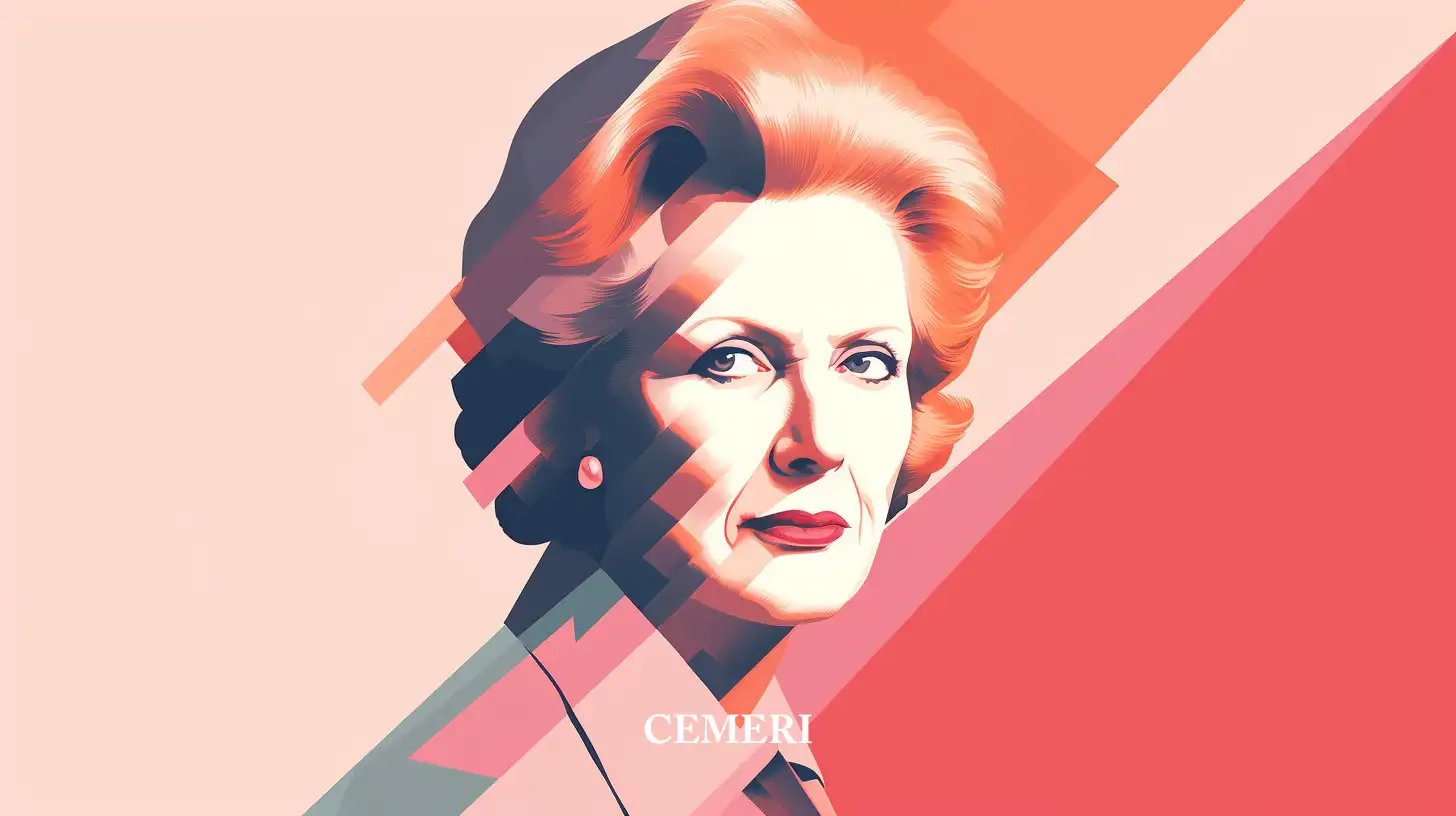Encyclopedia
Autor desconocido.
Who was Margaret Hilda Thatcher?
- Statesman. Prime Minister of Great Britain from the Conservative Party. Baroness. She is the first woman to hold this position, as well as the first woman to become Prime Minister of a European State.

Statesman. Prime Minister of Great Britain from the Conservative Party. Baroness. The first woman to hold this position, as well as the first woman to become Prime Minister of a State European.
Her tenure as Prime Minister was the longest in the 20th century. She is nicknamed the "** Iron Lady **" 1 due to her harsh criticism against her of the foreign policy and diplomacy of the USSR, in addition she implemented a series of conservative measures that became part of the politics of so-called "Thatcherism" in Great Britain.
Margaret Hilda Thatcher was born on October 13, 1925 in Grantham, UK. Her father, Alfred Roberts, ran two food stalls, was interested in politics, and was also a local civil magistrate and pastor. Her mother, Beatrice Ethel, worked as a dressmaker. The family raised another daughter - Muriel.
Since her father was a very educated and intelligent person, he instilled in the girls a love of literature and repeatedly accompanied them to the library. When Margaret Thatcher grew up a little, Alfred Roberts T. began to take her with him to council meetings, where the future politician watched the meetings go on and how various speakers spoke. Even then, she could adopt the experience of eloquence and behavior in front of the public.
Thatcher first went to school on Huntingtower Road. Due to her excellent academic performance and diligent behavior, she was awarded a scholarship to attend Grantham and Kesteven Girls' School. In addition to studying school subjects, she was also interested in art and sports. After receiving her high school diploma, Margaret studied chemistry at Somerville College, Oxford University. As a result, she graduated with honors from the university and became a Bachelor of Natural Sciences.
Political Career
In 1946, Margaret Thatcher was appointed president of the Oxford University Association of the Conservative Party. After graduating, she went to Colchester, where she became a member of the local conference. Making notable progress in the political field, she already in 1951 she participated in the elections of the Conservative Party, during the electoral contest, Margaret Thatcher also worked for an organization that investigates nutritional supplements.
In the Parliamentary elections of 1950-1951, she Margaret did not win, however she managed to attract attention. Various newspapers wrote many articles about the political woman. She was promised a good future and an increase in the number of supporters in the upcoming elections. And indeed, in 1959 she was elected to the House of Commons. In her speeches to officials, Thatcher demanded new reforms and changes in the Conservative Party's postulates.
In 1961, after the party's defeat, Margaret became involved in housing issues, she sought to develop subsidy programs to ensure housing for all and continued to be a strong critic of Labor ideology. Furthermore, Ella Thatcher called for the legalization of abortion, lower taxes and an end to the persecution of members of sexual minorities while at the same time, she advocated for the restoration of the death penalty.
Following the Conservatives' victory in 1970, Thatcher took over as Minister for Education and Science. She sought by all means to save the country's treasury from ruin, which is why she sometimes resorted to radical measures. For example, she canceled the delivery of milk to schools, which caused discontent in society.
After the Conservative Party lost the 1974 election, Margaret decided to become its leader. The candidate herself promised to make significant changes in the party's ideology, which, in her opinion, should have succeeded. In 1979, the people believed in Thatcher's promises, according to the results of the elections on May 3, 1979, the Conservatives confidently won, receiving 43.9% of the vote and 339 seats in the House of Commons. Labor received 36.9% of the vote and 269 seats in the House of Commons, and on May 4, 1979, Margaret Thatcher became Britain's first female Prime Minister. In this role, she made vigorous efforts to reform the British economy and society as a whole.
At that time, the country was not in the best position. Endless strikes, unemployment, inflation and other factors caused a storm of indignation among the British. For this reason, Margaret adopted a series of rather harsh reforms in an attempt to lead the state to prosperity. Thatcher established relations with the British colonies on the African continent, thanks to which she was able to perfectly strengthen her influence in this region.
The Falkland Islands and the conflict with Argentina
Argentine troops landed in the British Falkland Islands on April 2, 1982, triggering the start of the Falklands War. The ensuing crisis, as history has shown, was a key event during the Thatcher years of rule. At the suggestion of Harold Macmillan and Robert Armstrong, Margaret became the founder and president of the War Cabinet, which between April 5 and 6 of the same year set the task of regaining control of the islands for the British Navy. The Argentine army surrendered on June 14, 1982 and the military operation ended in success for the British side, although 255 British soldiers and three Falkland Islands residents were killed during the conflict. The Argentine winger lost 649 people.
Thatcher was criticized for neglecting the defense of the Malvinas Islands, as well as for the decision to sink General Belgrano. However, Thatcher was able to use all military and diplomatic options to restore British sovereignty over the islands. This policy was welcomed by the British, who markedly strengthened the shaky position of the Conservatives and Thatcher's leadership of the party before the 1983 parliamentary elections. Thanks to the "Malvinas factor", the economic recovery of early 1982 and the divisions between the Labor Party, the Conservative Party, led by Thatcher, managed to win the elections.
New political stage
In 1984, an event could have cost her her life. The Prime Minister was killed by members of the Irish Republican Army, as a result several innocent people died, but Margaret herself remained alive.
Throughout her tenure, Margaret Thatcher sought to make Britain a leader in world affairs. The prime minister repeatedly criticized the actions of the Soviet government. In particular, the woman herself accused the leadership of the Soviet Union of trying to dominate the world through military power. For this reason, she was among those who wanted to bring the USSR to the collapse. She managed to find a person who helped her achieve this goal. Mikhail Gorbachev. Even before becoming General Secretary of the CPSU, she flew to the UK, where she received a “royal reception”, Margaret Thatcher tried in various ways to find an approach to the Soviet politician and win him over.
Although Thatcher did much good for her country, as a politician she had a low level of trust among the population. An interesting fact is that the famous Winston Churchill experienced something similar in his biography. However, Margaret had little interest in her rating, both among the British and civil servants, when the Prime Minister began to increasingly neglect the views of her colleagues, they decided to remove Thatcher from her post.
Geoffrey Howe, the last of Thatcher's first cabinet, resigned as deputy prime minister on November 1, 1990, after Margaret refused to agree on a timetable for Britain to join the single European currency. The next day, Michael Heseltine announced his desire to lead the Conservative Party. According to public opinion polls, it was his personality that could help the Conservatives outpace Labour.
Although Thatcher managed to take first place in the first round of voting, Heseltine got enough votes (152 votes) for a second round. Margaret initially intended to continue the fight to a victorious finish in the second round, but after consulting with the Cabinet, she decided to withdraw from the election. After an audience with the Queen and her closing speech in the House of Commons, Thatcher resigned as Prime Minister on 28 November 1990. She regarded her removal from office as a betrayal.
In 1992 Thatcher became a member of the House of Lords and remained an active politician for quite some time. She was granted personal nobility with the title of baroness and coat of arms, she was an honorary citizen of Zagreb, a member of the Bilderberg Club, and the author of Statecraft: Strategies for a Changing World. Thatcher was elected a Life Member of the House of Lords. But, starting in 2002, her health deteriorated significantly and she gradually withdrew from public and political activities.
After retiring for a well-deserved rest, Ella Margaret began writing memoirs and later published several books. As before, she criticized the government, accusing some politicians of her inertia and uselessness. Thatcher went down in world history as the "Iron Lady" and the first female prime minister in British history. Margaret held this position longer than anyone in modern Europe and marked an entire era. Her bravery and confidence in making political decisions, which seemed crazy even to her comrades in arms, earned her the right to be a part of world history. And she, in fact, she became the first woman in politics of the 20th century, who turned the notion of politics into a male-only field of activity.
Margaret Thatcher died on April 8, 2013 in London at the age of 87 from a stroke. Her funeral was held at St. Paul's Cathedral, with military honors. After the memorial service, cremation was carried out and the ashes, according to the will of the deceased, were buried next to her husband Denis from her in the cemetery of the military hospital in the Chelsea region of London.
Sources
Moore, Charles. Margaret Thatcher, The Authorized Biography: Volume One (2013).
London: Penguin Books, 2014.
Yves Golder. From Parodies of the Iron Lady to Margaret Thatcher’s Political Image.
Polysèmes, Société des amis d’inter-textes (SAIT), 2020, ff10.4000/polysemes.7606ff. ffhal- 02962079f

